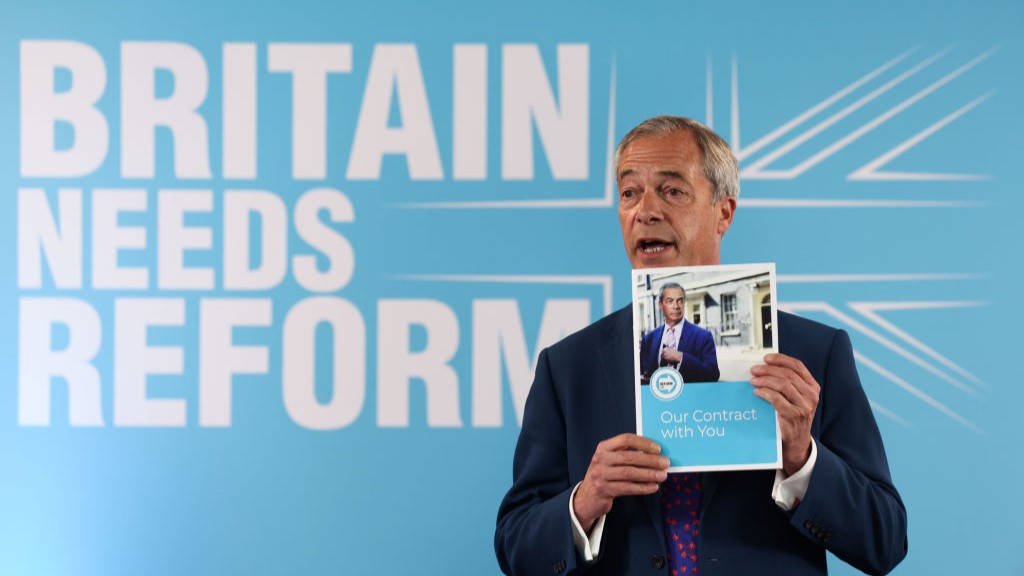Farage Outpolls Starmer As Preferred PM In Majority Of UK Constituencies

Table of Contents
Constituency-Level Breakdown: Where Farage Leads
Understanding the geographical distribution of this surprising shift is key. Constituency-level polling data reveals regional variations in voter preference, painting a complex picture of the UK's political mood. The Farage vs. Starmer contest isn't a uniform battleground.
-
Specific Examples: Early analysis indicates Farage enjoys a surprising lead in several traditionally Labour-leaning constituencies in the North East of England, as well as pockets of support in the Midlands and parts of the South. Specific examples, once the full data is released, will be crucial in understanding this trend. This isn't just about traditional red vs. blue; it's about a seismic shift in voter sentiment.
-
Data Visualization: An interactive map of the UK, colour-coded to represent the margin by which Farage outpolls Starmer in each constituency, would provide a compelling visual representation of these regional variations. This would allow for a clearer understanding of the geographic distribution of this surprising shift in public opinion.
-
Unexpected Results: The most surprising element is the breadth of this unexpected support. The emergence of Farage as a preferred Prime Minister candidate in constituencies not traditionally associated with his political ideology highlights the depth of dissatisfaction with the current political establishment.
Reasons Behind Farage's Unexpected Popularity
Farage's resurgence isn't merely a statistical anomaly; it reflects deeper currents in UK voter sentiment. Several factors contribute to his unexpected popularity:
-
Brexit Impact: The lingering effects of Brexit continue to resonate. While the initial vote was several years ago, the economic and social consequences remain a major concern for many voters, potentially fueling support for a figure who strongly championed leaving the European Union. This shows the long shadow cast by Brexit on UK politics.
-
Economic Anxieties: The cost of living crisis and broader economic anxieties are undoubtedly playing a significant role. Voters are looking for solutions to rising inflation and economic instability, and Farage's populist messaging may be resonating with those feeling financially squeezed. This is a key aspect in understanding the Farage vs. Starmer dynamic.
-
Anti-Establishment Sentiment: A deep-seated distrust of the political establishment is evident. Many voters feel disillusioned with mainstream parties, leading them to seek alternatives outside the traditional political spectrum. This anti-establishment sentiment is a key factor driving support for Farage, and this speaks to a broader dissatisfaction with the current political climate in the UK.
-
Specific Policy Positions: Farage's clear and consistent stance on issues like immigration and national identity likely appeals to a segment of the population feeling left behind or unheard by the mainstream parties.
Implications for the Upcoming Elections
The implications of this polling data are profound for the upcoming general election and the broader UK political landscape.
-
General Election Impact: Farage's strong showing necessitates a fundamental re-evaluation of election strategies for both the Conservative and Labour parties. The potential for a significant shift in the distribution of seats cannot be ignored.
-
Impact on Conservative and Labour Parties: The Conservatives face the challenge of stemming the loss of support to Farage, while the Labour party needs to understand why a significant portion of potential voters are looking beyond Keir Starmer. This unexpected challenge necessitates a rethink of their respective campaigning strategies.
-
Potential Coalition Scenarios: If the Reform UK party gains significant traction, the possibility of coalition governments involving Farage becomes a real prospect. This creates significant uncertainty about the future direction of British politics.
Impact on the Labour Party Strategy
The Farage vs. Starmer polling data forces a critical re-evaluation of Labour's electoral strategy.
-
Re-evaluating Campaign Messaging: Labour must reassess its messaging to address the concerns of voters who are currently leaning towards Farage. This requires a profound understanding of the underlying reasons for this shift in public opinion.
-
Addressing Economic Anxiety: A clear and credible plan to address the cost of living crisis and broader economic anxieties is paramount. Labour needs to demonstrate a viable alternative to what voters perceive as a failure of current economic policies.
-
Reaching Disaffected Voters: Labour must develop a strategy to reach out to voters feeling disillusioned with the political establishment. Ignoring this significant shift in public opinion would be a major strategic error.
Conclusion
This analysis of recent polling data reveals a surprising surge in support for Nigel Farage as a preferred Prime Minister in numerous UK constituencies, surpassing Keir Starmer. The reasons behind this shift are multifaceted, encompassing voter dissatisfaction with the established parties, lingering Brexit anxieties, and a broader anti-establishment sentiment. These findings have significant implications for the upcoming general election, forcing a reassessment of the political landscape and the strategies of major parties. The Farage vs. Starmer dynamic is shaping up to be a key battleground in the upcoming election.
Call to Action: Stay informed about the evolving UK political scene and the implications of Farage’s surprising lead in the polls. Follow us for further analysis of the Farage vs. Starmer race and the future of UK politics. What do you think about Farage outpolling Starmer as preferred PM? Share your thoughts in the comments below!

Featured Posts
-
 Mexico Noche De Lucha Entre Ufc Y Canelo Alvarez
May 04, 2025
Mexico Noche De Lucha Entre Ufc Y Canelo Alvarez
May 04, 2025 -
 Lindsey Buckingham And Mick Fleetwood A Studio Reunion
May 04, 2025
Lindsey Buckingham And Mick Fleetwood A Studio Reunion
May 04, 2025 -
 Corinthians X Guarani Onde Assistir Ao Vivo O Jogo Do Paulistao 2025
May 04, 2025
Corinthians X Guarani Onde Assistir Ao Vivo O Jogo Do Paulistao 2025
May 04, 2025 -
 Analyzing The Key Issues In Singapores Upcoming Election
May 04, 2025
Analyzing The Key Issues In Singapores Upcoming Election
May 04, 2025 -
 Exclusive Bianca Censori Fears Kanye West Says Source
May 04, 2025
Exclusive Bianca Censori Fears Kanye West Says Source
May 04, 2025
